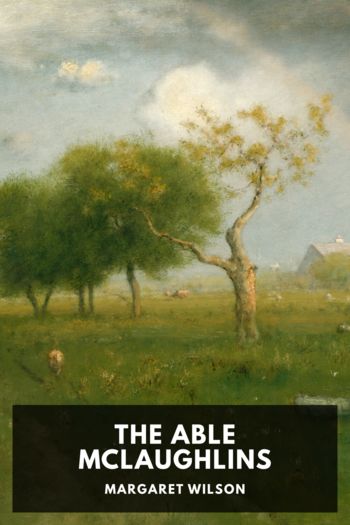The Able McLaughlins by Margaret Wilson (small books to read .TXT) 📕

- Author: Margaret Wilson
Book online «The Able McLaughlins by Margaret Wilson (small books to read .TXT) 📕». Author Margaret Wilson
What could a man do in the face of that? Where in the name of the shorter catechism had the woman got those shoes, and when—after all the money she had wasted that day on houses? McNair simply gave up. Like the Queen of Sheba before Solomon, he had no spirit left in him. But he had acquired an uncomfortable amount of fear of women.
Chirstie and Wully took it for granted that the rich wife had paid for the house, until the next Sabbath. Therefore, when Wully heard as he came out of church that his revered father-in-law had sold part of his newly bought land to Geordie Sproul, in a panic so to speak, in a hurry, without much bargaining, to get the required funds for the lumber, he grinned to himself, and waited to hear his mother’s comment on the tale. He took his family as usual home to his mother’s, after the service, and when dinner was over, he had a chance to speak with her alone. She heard his pleasant suspicions. Doubtless the new wife had made him sell that land. And she chuckled with deep, deep mirth.
“Yon’s a fine woman, Wully!” she exclaimed, relishing her thoughts. “She’s a grand wee captain!” She heaved sighs of contentment from time to time all the afternoon, whose import was not lost on her son. Surely, late as it was, Jeannie was being avenged.
Quite unconscious of the envious comment and the snickers of admiration which her house was causing among her neighbors, Barbara McNair went again with her husband to town, a month later, after the bluebells had faded in the creek woods, just when the wild roses were beginning to bloom, when the prairie was blue with spider lilies. She rode along arrayed like the lilies—not to say like the twenty-eight colors of wild phlox which a Dartsmouth botanist records he found there that year. When at length she came within sight of the town which stirred Isobel McLaughlin so greatly to speculation, she speculated upon it not at all. There was nothing significant to her in a town of eleven real estate offices and nineteen hotels, wherein every other inhabitant was a land speculator. She left the main street without paying it the compliment of a thought, and turned toward the first street of dwellings, a muddy lane not worthy to be called a street. The further down it she went, the more homesick she grew, so bare and naked it was, shack after shack uncared-for—wherever she turned, no gardens, no flowers, no trees, even in the year’s height of leaf and blossom. On she went, down one path after another. Then, away at the end of one—Oh, there she found a little, unpainted vine-covered shanty, with color, with fragrance, iris blooming, borders of clove pinks, pansies, a yellow rosebush, a red one, grapevines in blossom, a honeysuckle, budding peonies!
It came over her with such delight that it never occurred to her to hesitate. She pushed open the gate, and followed the path of clove pinks around the house. There in the shade a woman was bending over her washtub, a large, fat uncorseted woman, who raised a red face from her steaming work.
Barbara said to her positively and politely, moved to her broadest accent,
“I have come to see your flowers!”
The woman wiped her well-soaked hands on a limp apron, and replied in perfect Pennsylvania Dutch;
“I don’t understand you.” But she smiled a smile of extraordinary width.
They faced each other, Scotland and Germany, curiously for one moment. Then Barbara pointed dramatically at the pansies. There was that look on her face that was understood by frontierswomen of many tongues. The German began babbling sympathetically about her display, pointing out one beauty after another, breaking off little sprays to hold near her visitor’s longing nose. So much there was that Barbara wanted to ask, and her hostess wanted to explain, and they understood each other after so many repetitions and efforts! Barbara examined each plant, and felt the soil it grew in. She bowed her face down to them again and again, hungrily. Not one did she omit to sigh over enviously. Presently the German led her into the shanty, and set before her in a red-carpeted, closely-guarded parlor, coffee and coffeecake, which Barbara esteemed but lightly, surprised out of politeness by the fact that on the kitchen table a pair of





Comments (0)